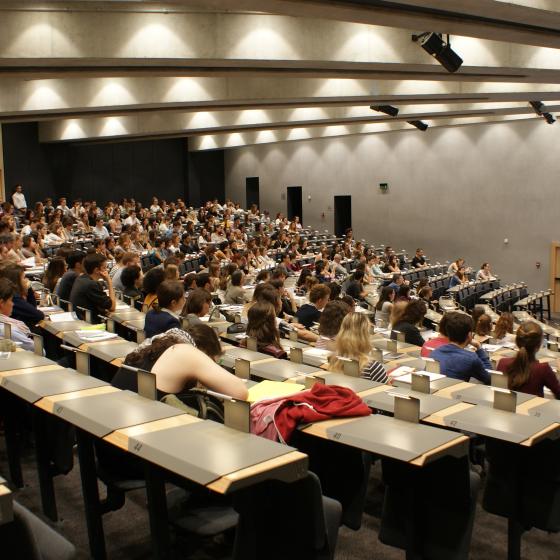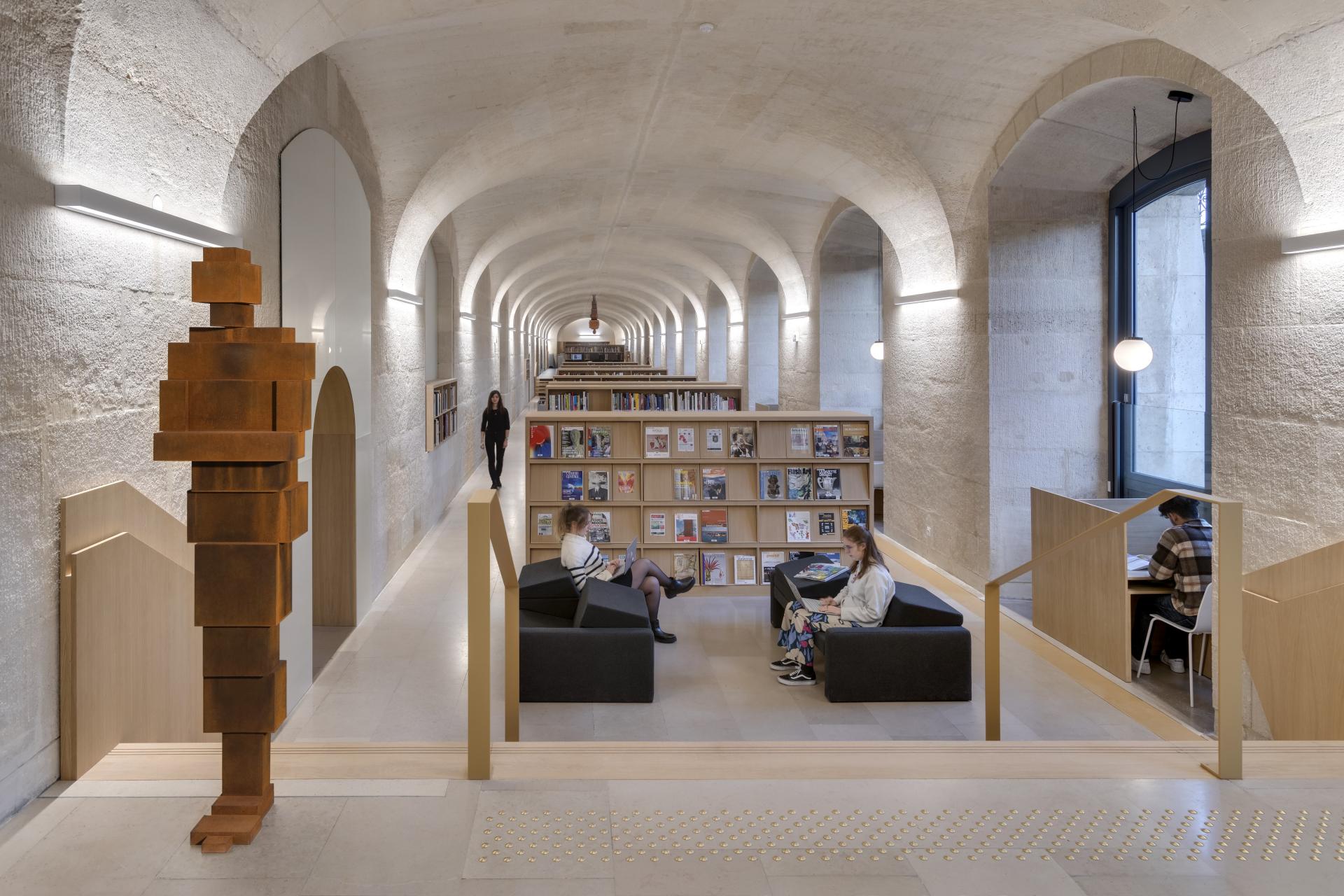
Master 2
Back to school day
Monday 8 September 2025 9AM À Paris, en amphiNature of teaching
The second year enables students to move into one of the following five fields:
- Research in art history, archaeology and museology
- Art market
- Mediation
- Management of works of art and preventive conservation
- Sensitive objects, provenance and international issues
The second year of the École du Louvre's second cycle includes seminars, the writing of a research dissertation or an internship dissertation depending on the course chosen, a compulsory internship and an applied modern language course.
The seminars are placed under the scientific direction of curators or heritage specialists or university professors.
The 5 Master 2 courses at the École du Louvre
The course aims to train specialists in art history and archaeology applied to collections, capable of rigorously carrying out a research project devoted to a specific period or field (monograph of artists, sites, study of artistic groupings, study of typologies or artistic genres...), by bringing together a carefully analyzed corpus, suitable documentation (archives, bibliography, surveys...) and methodological tools to conduct in-depth reflection on a precise theme.
The course opens up opportunities in the fields of conservation, exhibitions, national and international museums, cultural programming and art education.
The program includes two specialization seminars offered by the École, which have been significantly enhanced in recent years, and an opening seminar with partner institutions. These seminars in partnership are an opportunity to discover other teaching methods, other types of approaches open to the human and social sciences.
The course, which focuses as much on the market for ancient art as contemporary, the market for non-Western art as European, prepares students for the most varied professions in the art market, from the auction room to flea markets, via international fairs and the invisible market of brokerage and over-the-counter sales: antique dealer, broker, gallerist, cataloger, expert, legal advisor for sales, specialized journalist, consultant, purchasing advisor, expert for foundations, insurance companies, courts or customs.
The strength of the École du Louvre's Art Market program lies in the fact that, alongside courses in art market law and art history with a strong market-based perspective, it offers training in contact with industry professionals, auction house dealers, gallery owners, art market press journalists, those involved in market control, market communication specialists...
Provided by a multi-disciplinary team, it also draws on the experience acquired by the École du Louvre in its second preparatory course for auctioneers, and its long-standing and privileged links with the Université de Droit de ParisSud and its specialists. It encourages the marriage of theoretical knowledge (law, expertise) and practical application in contact with the reality of the market on the ground, taking advantage of its proximity to the high points of the Paris art market (Drouot, Faubourg Saint-Honoré, Saint-Germain-des-Prés), but also without neglecting its national and regional network, both of which are represented by a network of alumni who have become professionals.
The training program also benefits from an asset that is highly prized by dealers: the intimate material knowledge of the works acquired by École du Louvre students during a curriculum that includes instruction in preventive conservation, restoration, the history of collections and museums, tutorials in front of the works, and Objets de l'année de muséologie seminars. Lastly, it emphasizes a sound knowledge of market professions, their mechanisms and circuits, an awareness of the market's digital development and the learning of foreign languages, essential in negotiations.
Coordinators :
Géraldine Goffaux-Callebaut professor of private law, Université d'Orléans
Léa Saint-Raymond doctorate in art history, normalienne, agrégée de sciences économiques et sociales, in charge of the ARTL@S database
Sylvain Alliod editor-in-chief, Gazette de l'Hôtel Drouot
The Mediation course examines the ways in which collections can be disseminated to various types of audience (schoolchildren, professionals, businesses, etc.), proposing an in-depth study methodology and developing a range of dedicated actions. He places a strong emphasis on the definition and development of the educational project, on certain strategies for encounters between the object and its public, such as the exhibition medium, but also oral mediation (lectures, workshops...), written (educational guides, room sheets, publishing), or multimedia and the new possibilities offered by digital technologies.
The École du Louvre's training, complemented by an apprenticeship in the institutional workings, public policies and marketing strategies of museums, also anchors teaching as much in a mastery of theoretical fundamentals as in an applied perspective thanks to a mediation workcamp that enables students to deploy a rich and varied methodological reflection on concrete cases of cultural mediation projects in the Île-de-France region within a museum and a historic site.
Coordinators:
Frédérique Leseur Head of Public Services, Paris Musées
Raffaella Russo-Ricci Mediation Project Manager, Paris Musées, National Correspondent for France of the Committee for Education and Cultural Action of the International Council of Museums (ICOM CECA)
Peggy Derder Head of Written and Oral Mediation, Centre pompidou
This M2 course opened at the start of the 2023-2024 academic year. It aims to meet the current needs of museums, heritage institutions and the art market world regarding the acquisition of works and objects, their circulation, the documentation of their provenance, and the new questions and issues raised by the international context.
This course, within which a research experience and internship will be tailored to each student's project, clarifies the legal, ethical and scientific frameworks needed to secure the provenance of cultural goods.
Six seminars are given by leading specialists from public, museum, academic and administrative institutions involved in issues of spoliation, restitution and the fight against illicit trafficking in cultural property.
Coordinators :
Isabelle Anatole-Gabriel, Associate Researcher UMR 9022 Heritage.s, CUY Cergy Paris Université/CNRS/Ministère of Culture
Catherine Chevillot, General Curator - Préfiguration de la mission Provenance, Service des musées de France, Ministère de la Culture
Anne-Solène Rolland, General Curator of Heritage, Director of Heritage and Collections, musée du quai Branly-Jacques Chirac
This course combines reinforced teaching on preventive conservation, its issues, principles and implementation methods, with training in the management of works of art, designed to train students in the organization, coordination and management of the movement of works. It aims to prepare young professionals in the use of theoretical, administrative, legal and logistical tools useful for the material management of collections and the monitoring of the movement of works, and wishes to raise their awareness of the missions of the various heritage players involved through teaching provided by a multidisciplinary teaching team, régisseurs, architects, restorers, preventive specialists, but also specialists in law, scenography....
The specificity of the training offered by the École du Louvre is to combine in-depth knowledge of preventive conservation and mastery of the management of works of art, two intrinsically linked fields, in the service of the preservation-conservation and dissemination of collections, while also integrating knowledge of reserves, the specificity of exhibition management, technical, regulatory and accounting management tools, keeping pace with developments and the specialization of professions. The entire training program is applied to various types of collections.
The course also places strong emphasis on the acquisition of practical experience, both through an individual internship leading to the writing of an internship dissertation, and through a collective experience of a collections site, conducted within a museum institution, in relation to the current life of the establishments and with the versatility of the teams engaged on this type of mission. It's thus a first immersion in the day-to-day reality of the trades, in their technical skills, their interdisciplinary and professional openness.
Specific advice: - Internship and dissertation The second-semester internship needs to be thought through in advance. Students will benefit from thinking about locations and subjects as early as possible.
Coordinators :
Florence Bertin Head of Collections Department, Musée des Arts Décoratifs
Hélène Vassal Heritage Curator, Director of Collections Support, Musée du Louvre
Focus on the "Sensitive goods, origins and international issues" course
The École du Louvre has opened a new M2 course at the start of the 2023-2024 academic year:
Sensitive Properties, Provenances and International Issues.
It is aimed at École du Louvre M1 graduates (diploma in museology) and students from French and foreign universities with an M1 in art history or archaeology (access by equivalence and by project).
The aim of this course is to meet the current needs of museums, heritage institutions and the art market world with regard to the acquisition of works and objects, their circulation, the documentation of their provenance, and the new questions and issues raised by the international context.
This course, within which a research experience and internship will be tailored to each student's project, specifies the legal, ethical and scientific frameworks needed to secure the provenance of cultural property. Six seminars are given by leading specialists from public, museum, academic and administrative institutions involved in issues of spoliation, restitution and the fight against illicit trafficking in cultural property.
The design and pedagogical coordination of this course are entrusted to : Isabelle Anatole-Gabriel, PhD in art history, chief curator of heritage, former international civil servant at Unesco; Anne-Solène Rolland, general curator of heritage, director of heritage and collections at the musée du quai Branly-Jacques Chirac; and Catherine Chevillot, general curator - Préfiguration de la mission Provenance, Service des musées de France, Ministère de la Culture.
Reviews
Continuous assessment (attendance required). Dissertation defense.
Evaluation results in the award of credits (ECTS), 30 credits per semester, with 60 credits required to validate the teaching year.
The "Ecole du Louvre Graduate Diploma" sanctions this second year.
This diploma is accredited with the grade of Master.
(Arrêté du 6 mai 2019 - BO-MESR du 19 septembre 2019)
Contact
01.55.35.18.00 (general information)

